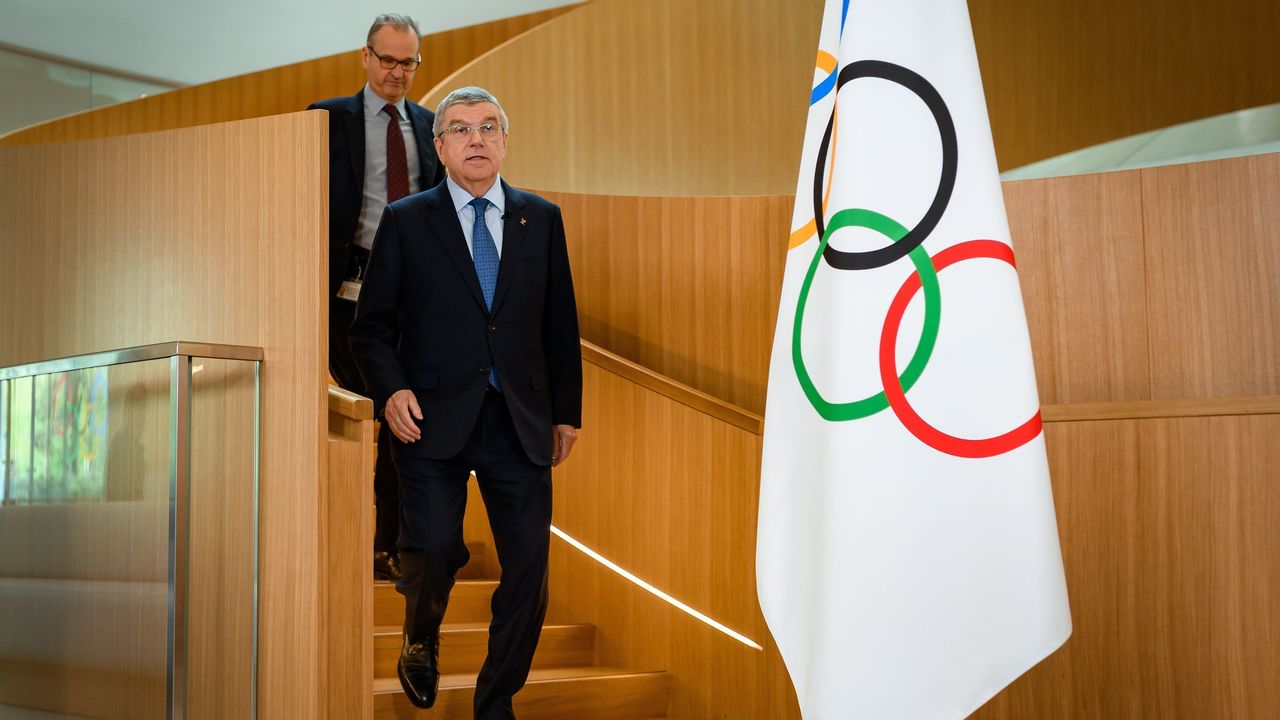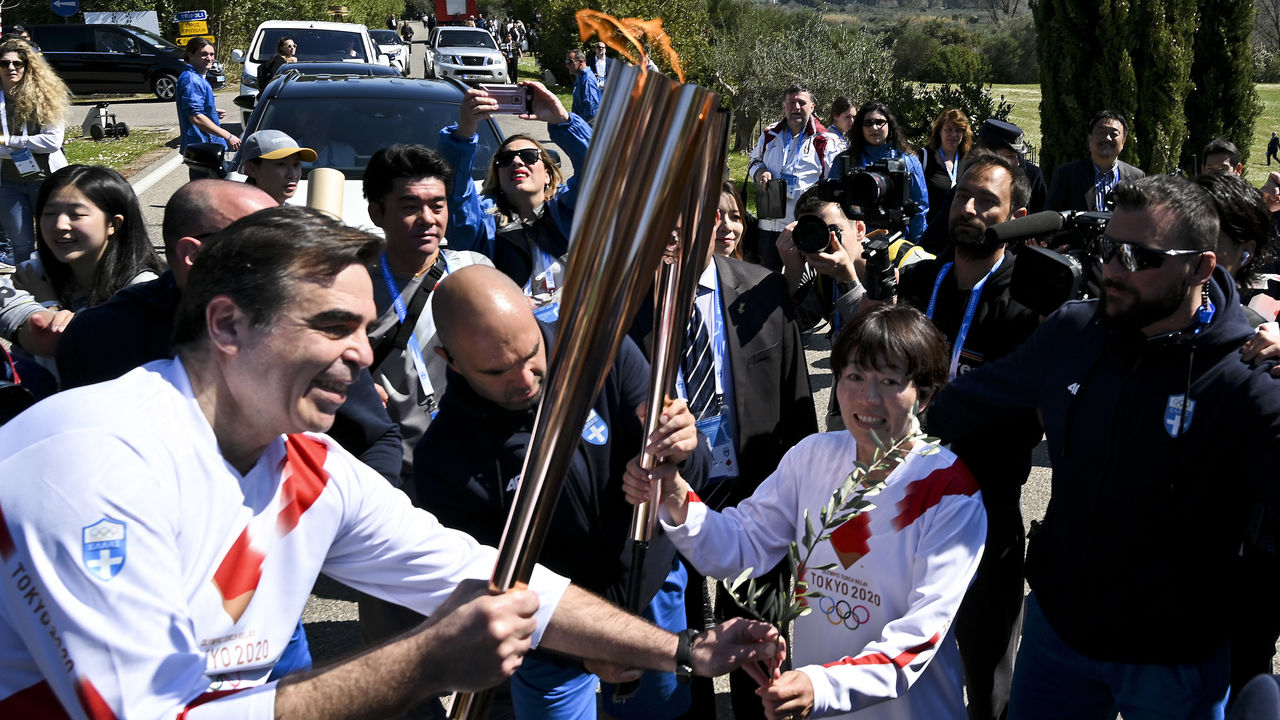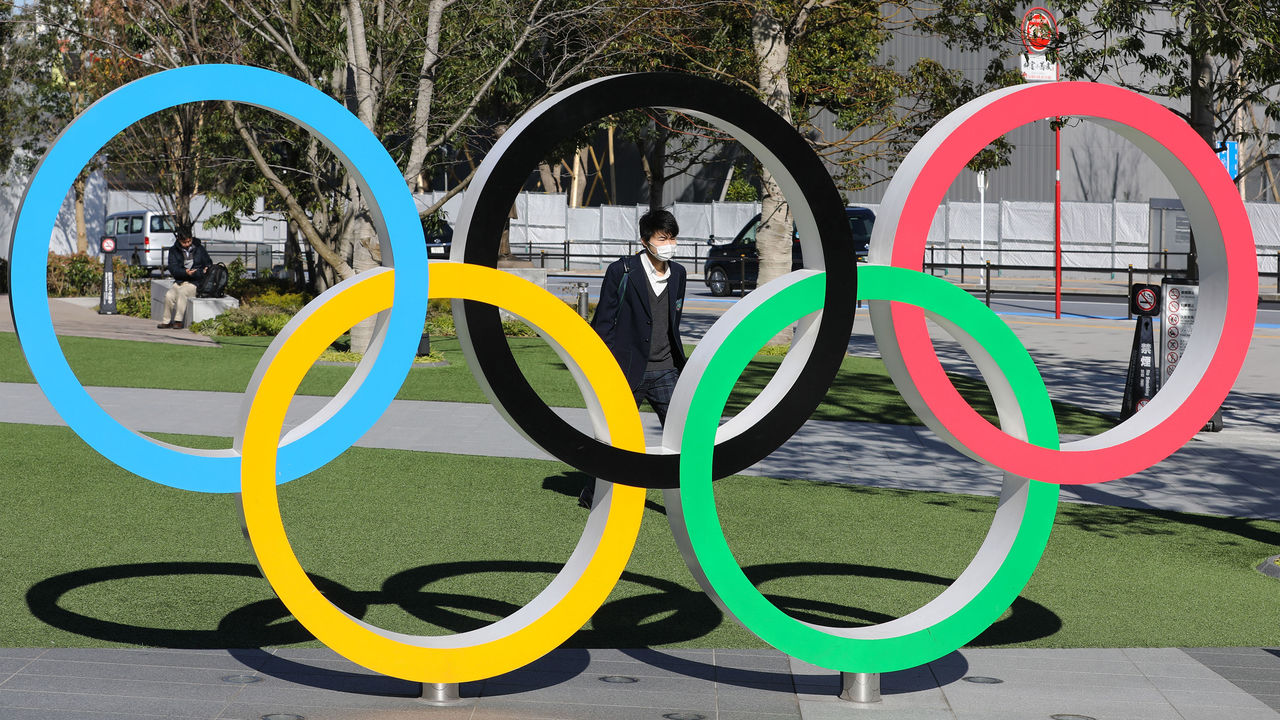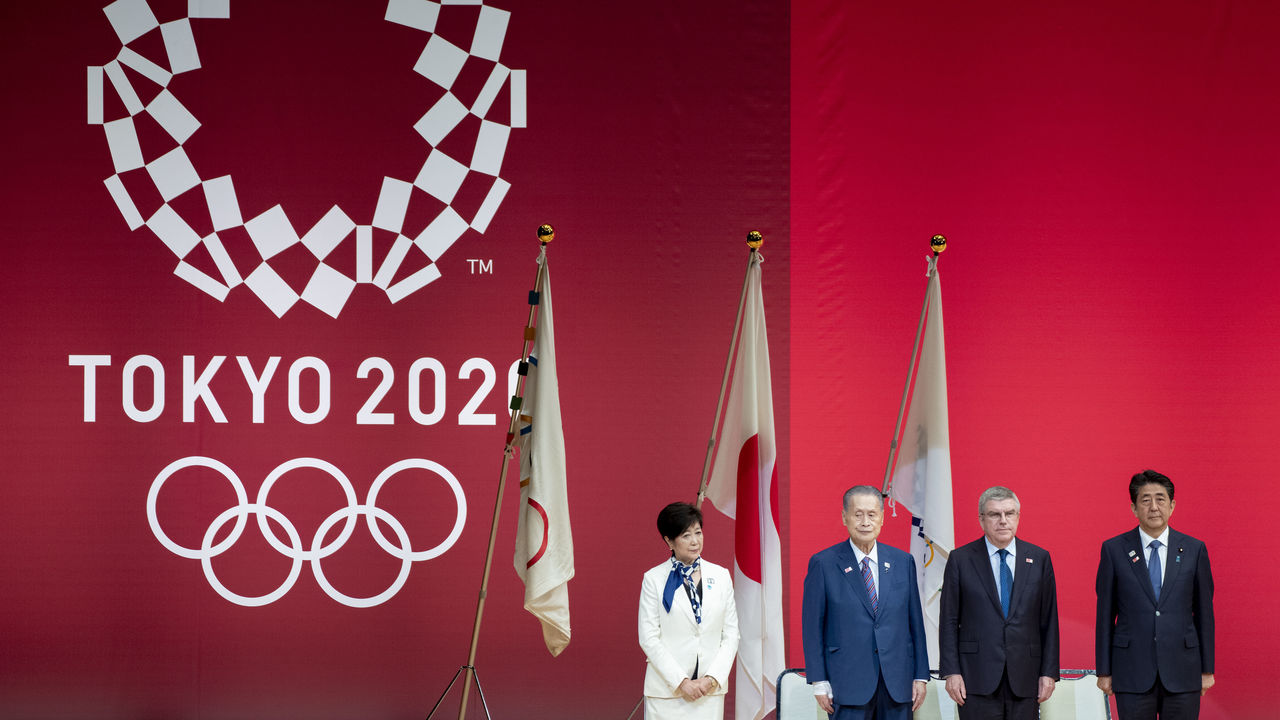In a global pandemic, is there such thing as a safe Olympics?
Last Thursday, as much of the sports world closed in on itself, Thomas Bach was in Olympia, Greece, the ancient cradle of the Olympic movement, meeting the circumstances of a global health crisis halfway.
The effort to mitigate the spread of the coronavirus has sidelined top leagues and major competitions everywhere, but the lighting of the Olympic torch ahead of Tokyo 2020 went on as intended - with one conspicuous adjustment. Fans were barred from a spectacle that usually draws thousands in a deliberate concession to the social-distancing practices this moment requires.
In front of select officials who were invited to witness the muted scene, Bach, the IOC president, stepped to a microphone to wax optimistic about the Summer Games' prospects.
"Nineteen weeks before the opening ceremony, we are strengthened in this commitment by the many authorities and sports organizations around the world, which are taking so many significant measures to contain the spread of the coronavirus," Bach said.
March Madness is canceled, the Masters delayed, and the Kentucky Derby deferred to Labor Day weekend. The NBA, NHL, and MLB seasons were put on hold ages ago, which is to say one week. The 2020 European soccer championship won't be played until 2021. Against this tide stands the Olympics, sports' biggest holdout in the face of a virus that reached pandemic status the day before the torch was lit and has already infected more than 200,000 people worldwide.

In recent weeks, IOC officials, local organizers, and Japan Prime Minister Shinzo Abe have maintained that COVID-19 won't prevent Tokyo 2020 from happening as scheduled. Before he entered mandatory self-isolation for 14 days upon his arrival home from Olympia, IOC vice president John Coates, the head of the Australian Olympic Committee, expressed confidence that the games will start on July 24. On Tuesday - when, incidentally, the deputy chief of Japan's Olympic Committee announced he tested positive for the virus - the IOC said in a communique that it "remains fully committed" to staging the event.
"We are in solidarity with the whole of society to do everything to contain the virus," the IOC wrote. The statement went on to add, "With more than four months to go before the games, there is no need for any drastic decisions at this stage, and any speculation at this moment would be counterproductive."
Inevitably, though, as qualifying events across a dozen-plus sports were postponed or canceled, and as the Greek leg of the torch relay to Tokyo was axed because of overcrowding, doubts about the viability of these Olympic Games - and concerns about the IOC's steadfast stance - seeped into the discourse.
A Kyodo News survey this week showed that 70% of Japan expects the Olympics won't be held on time. Katerina Stefanidi, the 2016 Olympic pole vault champion from Greece, opined on Twitter that the IOC is endangering athletes by expecting them to keep training during the outbreak. Canadian IOC member Hayley Wickenheiser, a retired women's hockey legend who's now a medical student, tweeted that the organization's insistence that the games will surely go ahead is "insensitive and irresponsible given the state of humanity."
Should the @olympics be canceled? No one knows at this point and that IS my point. To say for certain they will go ahead is an injustice to the athletes training and global population at large. We need to acknowledge the unknown. #COVID19 https://t.co/CssKuMaMhj
— Hayley Wickenheiser (@wick_22) March 17, 2020
Beyond the logistical complications that arise when qualifiers are scrapped, and beyond the qualms about opportunity costs that calling off the games would induce - the squandered revenue; the lost chances for athletes to shine - the IOC's coronavirus predicament raises questions that are particularly urgent amid an unfolding pandemic. At this point, does it seem like Tokyo 2020 could be held safely? From a public health perspective, should it go on as planned?
"Not under these circumstances," said David Earn, a mathematics professor at McMaster University in Hamilton, Ontario, who specializes in epidemiology. "Let's wait (for) when we're past this epidemic and people can enjoy the Olympics and there aren't the same risks."
With the U.S., Canada, and much of Europe in lockdown in attempts to flatten the virus' rate of infection, epidemiologists and infectious disease experts outlined in interviews with theScore a potentially disastrous worst-case scenario in which the convergence of millions of people in Tokyo this summer inhibits or undoes the progress generated by stringent social distancing. The fear is that such a gathering, commonplace at any Olympics, could exacerbate the reach of the virus as attendees return home to every corner of the globe.
"It would be a great event to spread disease worldwide," said epidemiologist Ali Khan, the dean of the University of Nebraska's College of Public Health. "There's no speculation in that. If you bring together hundreds of thousands of people for an event and some of (them) are infected, you are at risk of seeding the whole world again."

Social distancing, the epidemiologists emphasized, is essential in the meantime and will help curtail the global infection curve to some degree, though it's too early to know exactly how effective such measures will prove to be by July. The IOC's interpretation of this uncertainty seems to run counter to that of Earn, who said, ideally, the peak of the infection rate will be kept in check heading into summer and spread over several months.
"If we then have the Olympics," he said, "it's just the opposite of what we need to be doing."
The IOC certainly has more time to make its call than did leagues like the NBA and NHL, whose playoffs were fast approaching, or competitions like March Madness, whose start dates were imminent. But July isn't all that far away, said Stanford infectious disease specialist Dean Winslow, who added that the number of new COVID-19 cases would have to drop significantly in the next couple of months to convince health authorities in Japan and all participating countries that the Olympics wouldn't be unsafe.
By summer, Khan said, many countries will likely be closer to containing the virus, though that won't be true for every Olympic nation. To hold the games under such conditions would necessitate elaborate security measures, such as requiring every athlete to quarantine off-site for 14 days in advance. Perhaps, said Duke infectious disease epidemiologist Gregory Gray, the IOC could reduce risk in Tokyo by limiting crowds and aggressively conducting temperature screenings at the start and end of each day.
"Essentially, you would (need to) have a cohort of people who you know are not infected who can never come in any contact with anybody else, because you could just spread infection within the group and then you've sort of defeated the whole purpose," Khan said. "The challenges of that, I think, would be pretty amazing. But it's not impossible."

In interviews, Olympic scholars Jules Boykoff and Angela Schneider said several factors underlie the IOC's resolve to press forward: There's still some time before July 24, of course. Broadcasters such as NBC have paid billions for TV rights (and, in NBC's case, have sold more than $1 billion in advertising). Abe lobbied heavily to bring the Olympics to Tokyo. His country's annual GDP growth stands to decline by 1.4% if the 2020 Games are canceled, a Japanese securities firm estimated earlier this month.
The IOC's position can also be attributed to the organization's history, the scholars said - to its tendency over the decades to always push ahead. Schneider said this attitude derives from IOC founder Pierre de Coubertin's vision that the modern Olympics would champion human relations and peace. It has at times assumed a darker guise, Boykoff said, as when former IOC president Avery Brundage declared, "The Games must go on," two days after Palestinian terrorists killed 11 members of Israel's Olympic delegation at Munich 1972.
The Olympic Games, in fact, have only ever not gone on during world wars - in 1916, 1940, and 1944. Even in the wake of World War I and the Spanish flu pandemic a century ago, the Olympics resumed in Belgium in 1920.
If the IOC does end up canceling the Tokyo Games, "it would be tantamount to saying we're in war. And we are in war of a kind - a biological kind," said Schneider, the director of the International Centre for Olympic Studies at Western University in London, Ontario. "Not that we're fighting each other, but we're fighting to survive, to fight against the virus. I think there is a metaphor there."
"We're very much in uncharted Olympic waters," said Boykoff, who's written four books about the Olympics, and who argued in a New York Times opinion piece published Wednesday that the 2020 Games should be called off.
"If (the IOC was) to step up and do what I believe is the right thing - for the safety of the athletes and the global health of the whole entire world - if they were to do that, I would commend them. It's a tough decision, but it's one that I think absolutely has to happen."

According to Bloomberg, Abe sidestepped questions about potentially holding the games at a different time when he spoke to reporters on Monday. Instead, the prime minister said he wants to stage the Olympics and Paralympics, which are set to run from Aug. 25-Sept. 6, "in their complete form, as proof that the human race will conquer the new coronavirus."
To Earn, the McMaster professor, even the prospect of postponing the Olympics feels daunting. He said it's still too early to meaningfully predict whether the games could be held safely, for instance, a year from now in summer 2021. The efficacy of the social-distancing regimen we've just come to adopt could mean delaying the infection peak by many months, thereby spreading out the epidemic "for a very long time."
For now, Earn said, the most powerful action any of us can take is to keep that distance: stay at home, cut off in-person interactions, and prioritize a collective focus on slowing the virus.
"We have to, basically, endure this. We have to think about the health and safety of those who are most likely to succumb from these viruses," said Gray, the epidemiologist from Duke.
"The social distancing is necessary. We need to support our public health officials as best we can. They'll be making the calls, in partnership with all the athletic officials, about what the best course is for the Olympics, and we'll just have to go with what they say."
Nick Faris is a features writer at theScore.